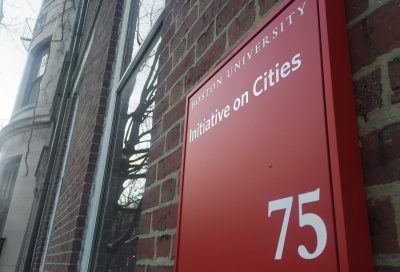
MADDIE MALHOTRA/ DFP FILE
Boston University students in the Kilachand Honors College will have the opportunity to make a difference in communities across the state in a new global health program called MetroBridge this year.
MetroBridge was created by the BU’s Initiative on Cities and seeks to make connections between university classrooms and the wider world to solve real public health crises, a
ccording to their website.
Emily Robbins, the program manager for MetroBridge, wrote in an email that the program was created in order to give students a way to have an impact on Boston-area communities outside of campus.
“MetroBridge was created in response to two pressing needs— one is that students are eager to impact their local communities and apply the skills they’re learning to real-world situations, and the other is that cities are always looking for new solutions to big challenges,” Robbins wrote in an email.
The program has projects across Massachusetts in seven cities and towns including Chelsea, New Bedford and Providence. The scope and nature of these projects varies from exploring homelessness and housing insecurity to analyzing the effects of airplane noise congestion.
“Our goal is that MetroBridge will not only have a positive impact on the local governments we work with, but also help students understand how the skills they’re building can be applied in the real world,” Robins wrote.
Cities could use MetroBridge in different ways, such as to uncover new policy ideas, survey residents to better understand their needs and priorities or analyze data sets to help drive decision making, Robbins wrote.
Students in the program work on city’s projects as class assignments while working directly with local government leaders during the semester.
“In this way, we are empowering students to tackle real-world issues while also helping city leaders confront key urban challenges,” she wrote.
Carrie Preston, a professor of English in KHC who is involved in the program, wrote in an email that MetroBridge is an exciting opportunity for students to use their creativity to help communities.
“We often keep them behind their books and computers, saying that they will make a difference later,” Preston wrote. “I think that is a misuse of their talents.”
Preston wrote that she hopes the MetroBridge program will be eye-opening for students and help them understand that global health is all around them.
“I hope they feel empowered to find solutions that could actually be enacted,” she wrote.
Urban issues should be important to students, Preston wrote, because “city issues are OUR issues.”
David Glick, the faculty director for MetroBridge, wrote in an email that the program benefits all who are involved.
“I think matching students and classes with local government projects … will enable all of us that work with the program to help our colleagues help their students by trying new class models, and to hopefully be part of making an impact on local policy,” Glick wrote.
He added that programs like MetroBridge help fulfill the needs of local governments that can be under-resourced and that these municipalities benefit from the quality of work produced by the faculty and students involved.
For these reasons, Glick wrote, the work of programs like MetroBridge is more likely to be valued by the cities with which they partner.
BU Spokesperson Colin Riley said that BU has always had a strong relationship with cities.
“It’s in our DNA to have that relationship, that anything that is in the interest of the city is something we’re in support of,” Riley said.
Riley said that the MetroBridge program is one of many opportunities BU students have to partner with cities and grow the university’s positive relationship with them.
BU’s Initiative on Cities is a long-standing program, he said, that has helped cities find solutions to their problems and improve the services they provide to their citizens.
Marie Alameida, a sophomore at the College of Arts and Sciences, said she believed it was important for students to be involved in their communities.
“I think it’s good for students to reach out to the community no matter what,” Alameida said. “I think it just kind of allows them to understand what’s going on around them.”
CAS freshman Matt O’Rourke said he thought the MetroBridge program sounded interesting.
“It sounds like a great opportunity to get out of the classroom and do something for our city that we live in,” he said.























































































































